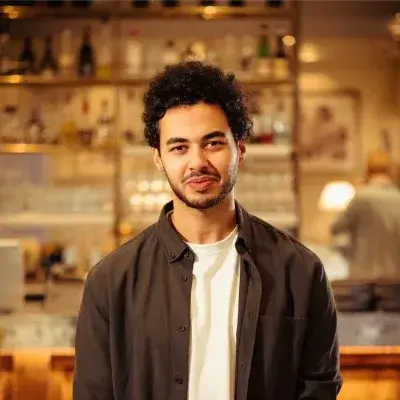Ready to launch your own podcast? Book a strategy call.
Frontlines.io | Where B2B Founders Talk GTM.
Strategic Communications Advisory For Visionary Founders
Conversation
Highlights
From Legacy Systems to Digital Innovation: How Gotab is Reimagining Restaurant Operations
Running a high-volume restaurant in today’s labor market requires a delicate balance of efficiency and guest experience. But when many establishments are still running point-of-sale systems on Microsoft DOS, achieving that balance becomes nearly impossible.
In a recent Category Visionaries episode, Gotab co-founder Tim McLaughlin shared his unique journey from enterprise software to revolutionizing restaurant technology. His experience owning breweries while building technology solutions has given him rare insight into both sides of the industry’s transformation.
The path to product-market fit wasn’t straightforward. “It took us, frankly, about two years to finally get what we consider product market fit,” Tim recalls. When Gotab introduced QR ordering to tables in 2018, they faced significant resistance from the industry. “Consumers may want it, but restaurant operators don’t,” was the common response they encountered.
This resistance stemmed from deeply ingrained industry assumptions. As Tim explains, “Restaurant tours frequently believe that the guests come to talk to them.” However, his experience showed that “the reality is a lot of guests come to talk to their friends and eat the food and drink that is offered there.”
The COVID-19 pandemic became an unexpected catalyst for change. “All the people who told us this is the dumbest thing I ever thought I ever heard in 2019, called us back in 2020,” Tim notes. The pandemic “accelerated the US adoption of QR by probably three to five years, virtually overnight.”
But Gotab’s vision extends far beyond QR ordering. They’ve taken a fundamentally different approach to restaurant technology architecture. While many competitors try to do everything – from time tracking to payroll – Gotab focuses deeply on three core areas: commerce, operations, and logistics.
This specialization has led to remarkable results. Tim shares a compelling metric: “Restaurants typically try to stay under 30% of their revenue is spent on labor. And our restaurants, on average, have a 22% labor cost, which is basically 25% below the industry norm.”
The company’s go-to-market strategy focuses on high-volume establishments rather than chasing location counts. As Tim explains, “If I can go win a $30 million restaurant… it’s actually a lot better for us as a business. And we can also build some really rich functionality for those operators to create a bespoke experience.”
This focus on larger operations has shaped their product development. Traditional POS systems often ignore kitchen operations entirely. Tim notes that some major competitors have restaurants “buying another product to run the kitchen, which is to me, just such a… it kind of misses the point, because one of the core tenants we have is that the guests want to know what’s going on in the kitchen.”
Looking ahead, Tim envisions a future where payments become invisible. He describes a seamless experience where multiple orders from different venues, retail purchases, and experiential activities like golf simulators all integrate into one frictionless transaction. “We think that the best technology is invisible and magic,” he says, “we want all these things to disappear so you can enjoy the experience.”
For founders building in traditional industries, Tim’s journey offers valuable lessons about patience and timing. Sometimes the market needs an external catalyst to embrace innovation. The key is maintaining your vision while building infrastructure that can scale when the opportunity arrives.
The transformation of restaurant technology mirrors broader patterns in enterprise software adoption. As Tim puts it, “My background is actually enterprise software. And in enterprise, there’s a very clear path for best of breed.” By applying these enterprise principles to restaurant operations, Gotab is helping define what modern hospitality technology looks like.
Actionable
Takeaways
Identify and Solve the Unsexy Problems:
While many restaurant technologies focus on flashy features or try to do everything, GoTab recognized the critical importance of back-of-house operations and logistics. By tackling unglamorous but essential challenges like kitchen management and order fulfillment, the company has helped its clients achieve significant labor cost savings and improved profitability.
Prioritize Product-Market Fit Over Vanity Metrics:
Rather than chasing the highest number of restaurant locations, GoTab focuses on the size, scale, volume, and profitability of its clients. By targeting high-volume establishments and delivering measurable value, the company has achieved strong retention and growth, even if it means having fewer but more impactful partnerships.
Embrace Cultural Shifts and Adapt Accordingly:
When GoTab first introduced QR code ordering in 2018, it faced resistance from restaurant operators who were attached to traditional service models. However, the COVID-19 pandemic accelerated the adoption of contactless technology and forced the industry to prioritize efficiency, validating GoTab's vision and positioning the company for rapid growth.
Look Beyond the Status Quo and Work Backwards:
Tim and his team strive to envision how restaurants should operate ten years into the future, then work backwards to adapt those concepts to current realities. While this forward-thinking approach may not always align with industry norms, it allows GoTab to push boundaries and introduce innovative solutions that redefine the dining experience.
Aim for Invisible, Magical Technology:
GoTab's ultimate goal is to make payments and transactions disappear, creating a seamless, frictionless experience for guests and staff alike. By leveraging customer identity, membership status, and contextual data, the company seeks to streamline ordering, fulfillment, and payment processes, allowing people to focus on the social and culinary aspects of dining out.


























